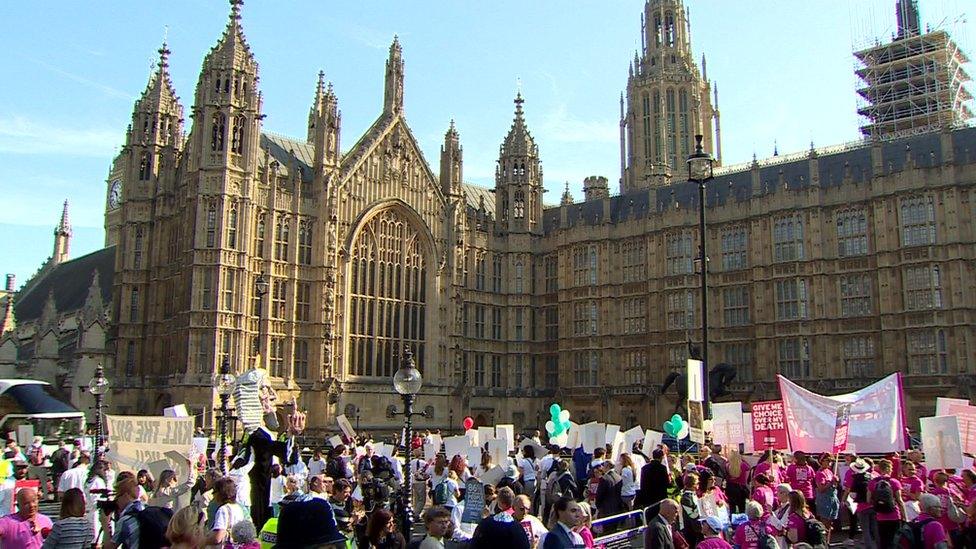A very big NO
- Published

Both sides of the argument turned out in force for the assisted dying debate.
In the end it was a massive defeat; the Commons voted by two to one (330 votes to 118) against the Labour MP Rob Marris's Assisted Dying Bill - a decisive result, which destroys any chance of a measure of this kind getting through this Parliament.
As the debate unfolded, and it was a huge turnout for a Friday private members bill debate, it became increasingly obvious that the balance of opinion was strongly against the Marris Bill, with plenty of MPs clearly worried that it would take the country across a moral Rubicon. And even though there's a parallel Bill being reintroduced into the Lords by is progenitor, Lord Falconer, the former Lord Chancellor, something big has to change - some dramatic case has to come to public notice, and swing opinion - to make it more than a token effort.
The loss of his bill should not reflect badly on Rob Marris, the Labour MP who topped the private members bill ballot - his carefully unemotional delivery and evident mastery of his case was precisely right in a highly charged Commons atmosphere. He ran through his list of safeguards - two doctors would have to certify a patient was terminally-ill; a High Court Judge would have to be satisfied there was no coercion; a 14-day cooling off period would follow, and even at the last moment the patient could refuse to take the drugs that could end their life, and the medical practitioner sent to oversee the procedure would have to take them away.
But opponents were not won over. There were powerful interventions from MPs like Yasmin Qureshi and later Tim Loughton describing how their parents had been desperately ill, in circumstances where they might have taken the option of assisted dying if it had been available, and had then recovered, at least for a while. And there were plenty more powerful speeches and emotional anecdotes from MPs on every side of the question.
The cliché is that the House of Commons is at its best in this kind of debate; and on this evidence it's true. Maybe one reason is that, for once, MPs can speak from the heart, rather than have to toe some line or rebel against it.
This was the first test of the new 2015 Commons on a "conscience vote" but it's on an issue beyond the gay rights and abortion territory in which most such debates have taken place. I'm not sure that there's a read-across to those more familiar questions, but perhaps there is for issues about stem cell technology or cloning, or the very latest capabilities of medicine; we shall see.
In that context, one interesting comment came from the SDLP's Mark Durkan, who remarked that he was no more taking the "Church Whip" in opposing this Bill, than he had in supporting equal marriage for gay people, in the last parliament.